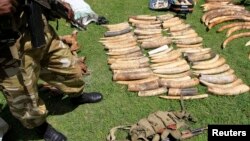BEIJING —
An international crackdown on wildlife crimes involving countries in Asia, Africa and the United States is claiming a significant victory. Chinese authorities say they took the lead in a broad effort to curb wildlife poaching.
A cross-border crackdown on wildlife crimes has resulted in hundreds of arrests and seizures of banned wildlife specimens, marking the first international effort led by China to reduce illicit trade in endangered species.
Between January 6 and February 5, the United States and countries in Africa and Asia cooperated in the operation code-named COBRA that specifically tried to dismantle wildlife crime syndicates.
Steven Galster is director of the Bangkok-based Freeland Foundation, an anti-trafficking organization that supported operation Cobra with research and information on wildlife crime it had collected over several years.
“China came out and actually was the government that proposed a joint operation,” he noted.
During the operation officials seized some 6,500 kilograms of elephant ivory, 2,600 live snakes, 22 rhino horns, and 1,500 kilograms of shatoosh, made from the down hair of an estimated 10,000 Tibetan antelopes.
China’s Foreign Ministry spokesperson Hong Lei spoke about the success of the operation in a briefing with reporters Monday.
He said the Chinese government is paying great attention to the protection of wildlife, including elephants. Hong Lei said while some people turn a blind eye to China’s efforts, the operation yielded significant results.
Demand from China has resulted in a huge increase in illegal wildlife poaching of endangered species in Africa. In 2011 an estimated 44 tons of illegal ivory was seized world wide, representing the deaths of thousands of elephants. Earlier this month the country of Gabon announced that poachers had killed 11,000 elephants there since 2004. Similarly, African wild rhinos used to number in the hundreds of thousands; there are less than 30,000 alive today.
Asian and African governments have been making efforts to link police, customs and wildlife officers from around the world to better combat smuggling and poaching networks. The latest operation involved law enforcement personnel from Africa’s Lusaka Agreement Task Force, Thailand, India, Vietnam, Indonesia and China.
While Operation Cobra targeted poachers, Steven Galster says China’s government is also trying to reduce demand from Chinese buyers.
“They’re targeting folks that are going overseas, naturally those that are going to go work in Africa,” he said.
The illegal wildlife trade totals $8 billion to $10 billion annually, drawing poachers and smugglers to profit from the killing of endangered species. With Chinese investment and trade with Africa soaring, sustaining the impact of Operation Cobra will be the next challenge for Asian and African nations.
A cross-border crackdown on wildlife crimes has resulted in hundreds of arrests and seizures of banned wildlife specimens, marking the first international effort led by China to reduce illicit trade in endangered species.
Between January 6 and February 5, the United States and countries in Africa and Asia cooperated in the operation code-named COBRA that specifically tried to dismantle wildlife crime syndicates.
Steven Galster is director of the Bangkok-based Freeland Foundation, an anti-trafficking organization that supported operation Cobra with research and information on wildlife crime it had collected over several years.
“China came out and actually was the government that proposed a joint operation,” he noted.
During the operation officials seized some 6,500 kilograms of elephant ivory, 2,600 live snakes, 22 rhino horns, and 1,500 kilograms of shatoosh, made from the down hair of an estimated 10,000 Tibetan antelopes.
China’s Foreign Ministry spokesperson Hong Lei spoke about the success of the operation in a briefing with reporters Monday.
He said the Chinese government is paying great attention to the protection of wildlife, including elephants. Hong Lei said while some people turn a blind eye to China’s efforts, the operation yielded significant results.
Demand from China has resulted in a huge increase in illegal wildlife poaching of endangered species in Africa. In 2011 an estimated 44 tons of illegal ivory was seized world wide, representing the deaths of thousands of elephants. Earlier this month the country of Gabon announced that poachers had killed 11,000 elephants there since 2004. Similarly, African wild rhinos used to number in the hundreds of thousands; there are less than 30,000 alive today.
Asian and African governments have been making efforts to link police, customs and wildlife officers from around the world to better combat smuggling and poaching networks. The latest operation involved law enforcement personnel from Africa’s Lusaka Agreement Task Force, Thailand, India, Vietnam, Indonesia and China.
While Operation Cobra targeted poachers, Steven Galster says China’s government is also trying to reduce demand from Chinese buyers.
“They’re targeting folks that are going overseas, naturally those that are going to go work in Africa,” he said.
The illegal wildlife trade totals $8 billion to $10 billion annually, drawing poachers and smugglers to profit from the killing of endangered species. With Chinese investment and trade with Africa soaring, sustaining the impact of Operation Cobra will be the next challenge for Asian and African nations.




